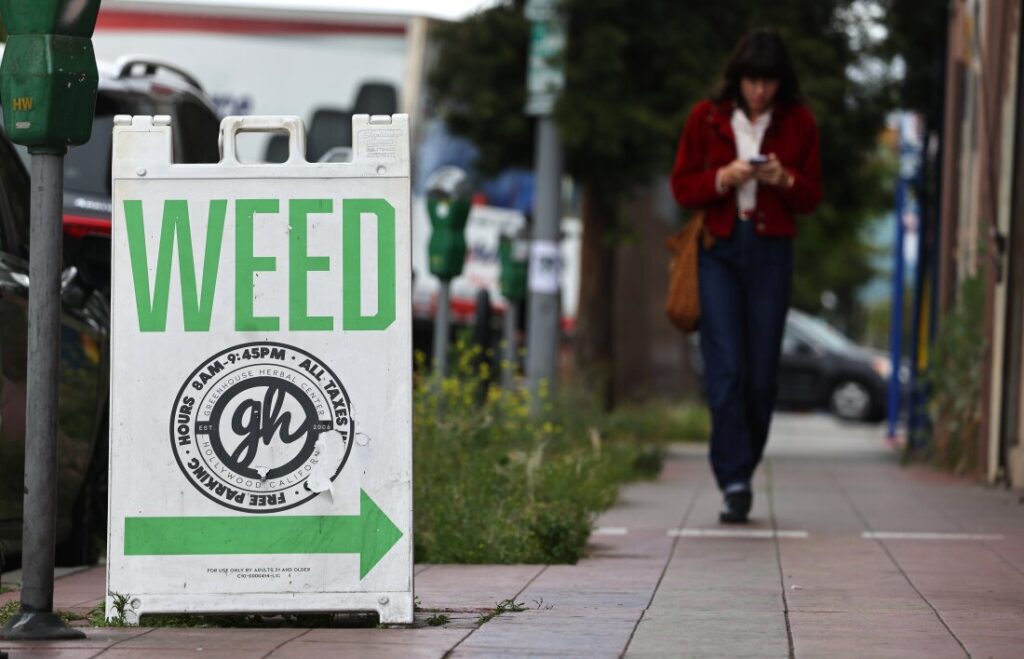President-elect Donald Trump is expected to come to the White House with a laundry list of policies he wants to change or reverse. The Biden administration has moved to ease longtime restrictions on cannabis — so, what might Trump’s arrival mean for the push to legalize marijuana?
There are signs that cannabis could be a rare issue on which Trump carries a Biden policy forward.
President Biden’s administration has proposed removing marijuana from the list of Schedule I controlled substance and making it a Schedule III drug, a category that acknowledges medical benefits. Along with its implications for potential markets and consumers, the move would boost medical research into cannabis.
David Culver, the senior vice president of public affairs of the U.S. Cannabis Council lobbying group, tells NPR that he’s optimistic the new administration will take a similar approach to cannabis.
“We didn’t see a lot of activity from President Trump, if any at all, on cannabis reform” in his first term, Culver says. “But I think this time is going to be different.”
What has Trump said about marijuana?
Two months before the election, Trump issued a statement largely aligning himself with the Biden administration and his election opponent, Vice President Harris. In it, he affirmed that he supports legalizing the recreational use of marijuana.
“I believe it is time to end needless arrests and incarcerations of adults for small amounts of marijuana for personal use,” he said in a Truth Social post. “We must also implement smart regulations, while providing access for adults, to safe, tested product.”
Trump said he would vote “yes” on Florida’s recreational cannabis ballot question (the proposed amendment fell short of its 60% threshold). And he suggested Biden’s cannabis policy might remain intact.
“As President, we will continue to focus on research to unlock the medical uses of marijuana to a Schedule 3 drug, and work with Congress to pass common sense laws, including safe banking for state authorized companies,” Trump said.
What about Project 2025?
Cannabis and marijuana aren’t directly mentioned in Project 2025, an expansive text that is seen as laying out a conservative agenda for the next Republican administration.
“The next President’s top drug policy priority must be to address the current fentanyl crisis and reduce the number of overdoses and fatalities,” the document states, citing the staggering toll of opioids.
The document emphasizes the need to take on drug trafficking organizations and disrupt the flow of illegal drugs into the U.S.
A Republican administration “must reaffirm a commitment to preventing drug use before it starts, providing treatment that leads to long-term recovery, and reducing the availability of illicit drugs in the United States,” it says.
How will Trump’s second term differ from his first?
“When Trump was president first time around, we had an attorney general that was absolutely — I would consider him a prohibitionist,” Culver says, referring to former Attorney General Jeff Sessions.
In early 2018, Sessions rescinded an Obama policy that had directed federal prosecutors not to prioritize enforcing cannabis laws — a move that triggered concerns that the central government might crack down in states where cannabis laws diverged from U.S. law.
“I don’t think we’re going to have that this time around,” Culver says. “I think that the president is going to appoint someone that takes a more neutral position and/or pro position on cannabis reform. And we’re going to have people inside this administration like Robert F. Kennedy Jr., who are going to have a prominent role that are pro-legalization champions.”
Despite Sessions’ strong opposition to cannabis, Trump said in 2018 that he “probably will end up supporting” bipartisan legislation to let states craft their own laws on marijuana.
Culver says that Trump’s perspective seems to center on public safety and creating a regulated market — while keeping cannabis away from kids.
An email to the Trump campaign seeking details about the incoming president’s plans for cannabis in his second term did not get a reply before this story published.
H/T: www.npr.org



